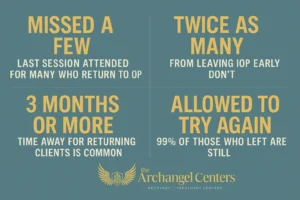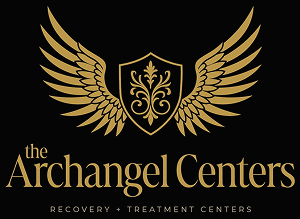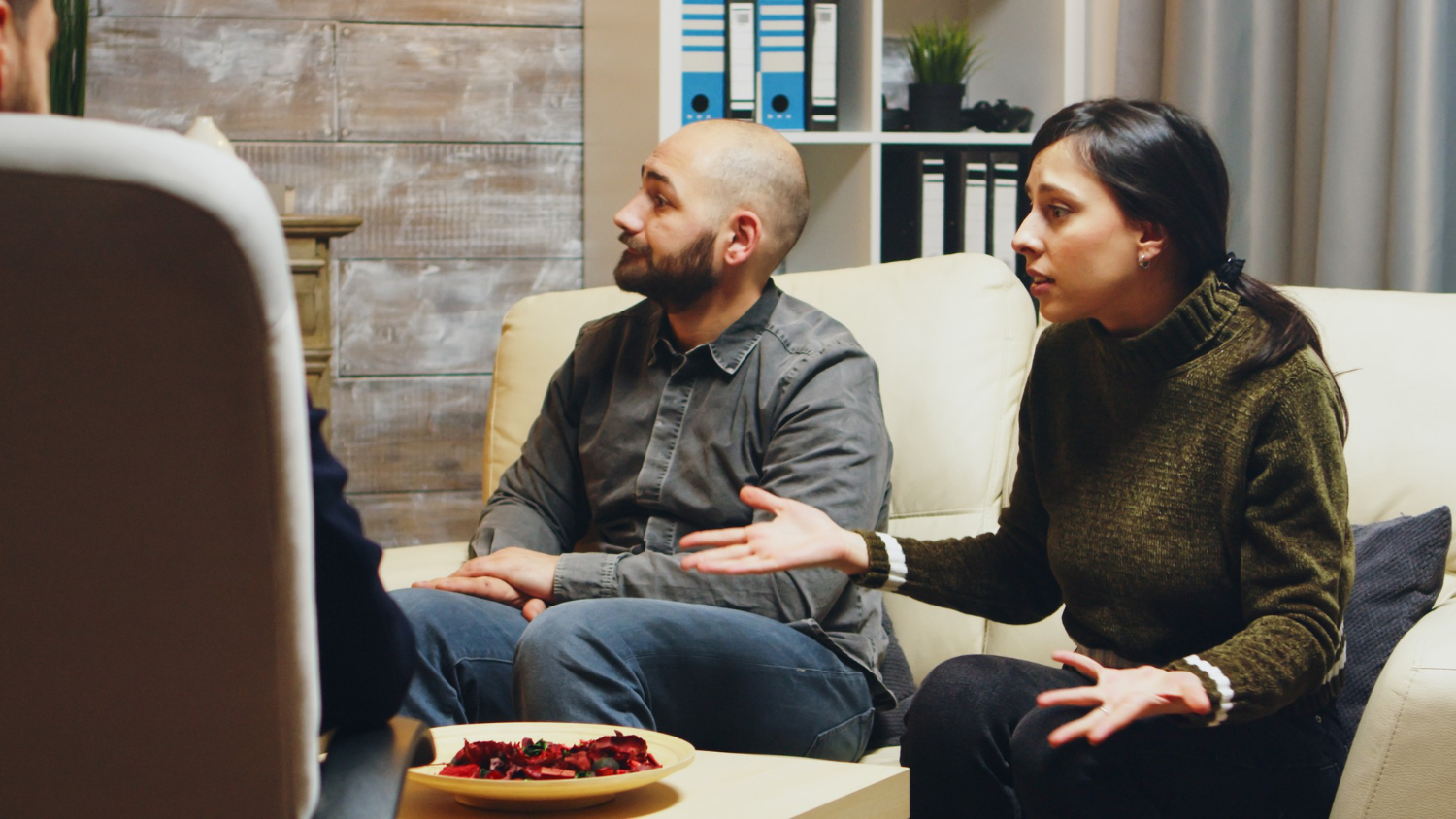You didn’t blow your only chance.
You didn’t waste it.
And you are not too far gone to try again.
If you walked away from an Intensive Outpatient Program (IOP) early, there’s probably a quiet weight you’ve been carrying—guilt, self-doubt, the awkwardness of not knowing if you’re “still allowed” to come back. Maybe it started with missing a session or two. Then it turned into avoiding calls. Then it felt easier to disappear.
That doesn’t make you weak. It makes you human.
At Archangel Centers, we’ve worked with countless people who left before they were ready—and we’ve welcomed them back with zero judgment. Because recovery isn’t a straight line. It’s full of pauses, pivots, and second starts. And those second starts are often the most honest ones.
Here’s how to give recovery another shot if you left your Intensive Outpatient Program in New Jersey too soon—and what to expect when you’re ready to reconnect.
1. Let Go of the Idea That You Failed
You didn’t fail. You paused.
And pausing isn’t the same as quitting. It might have felt like too much at the time. Maybe life got loud. Maybe you felt overwhelmed, misunderstood, unready. Or maybe the program was helping—and that scared you more than you expected.
Whatever the reason, leaving early doesn’t mean you don’t care about recovery. It doesn’t mean you blew your one shot. It just means something shifted—and now you’re shifting again.
That’s not failure. That’s forward motion.
2. Take the Smallest Step Toward Contact
If picking up the phone feels like too much, start with a sentence.
One message. One email. One call that says, “I think I’m ready to try again.” That’s enough.
You don’t need to write a long apology or explain where you’ve been. Just open the door—and we’ll help you walk through it.
If you’re near Central New Jersey or East Windsor, we’ll connect you with the closest option to make re-entry simple and stress-free.
3. Know That You’re Not Starting From Scratch
Even if it’s been a while, you’re not back at square one.
You still carry what you learned. You still remember how showing up felt. That insight stays with you—whether it’s been two weeks or three months since your last session.
And this time around, you’re not walking in blind. You know what to expect. You know what parts helped and what didn’t. That’s a powerful position to return from.
Recovery isn’t like a video game where you lose all your progress. It’s more like a book—you’re picking it up mid-chapter, not tearing out the pages.

4. Expect Curiosity, Not Criticism
One of the biggest fears people have when returning is that they’ll be judged. But here’s what actually happens:
We’ll listen. We’ll ask what’s different now. We’ll ask what kind of support you want this time. We might adjust your treatment plan. We might recommend a lighter schedule to help you ease in. But we won’t scold you or quiz you on where you’ve been.
This is your care. We’re here to make it fit you—not force you to fit it.
5. Tell Us What Didn’t Work (So We Can Do It Better)
Maybe the timing didn’t work. Maybe the group didn’t feel right. Maybe it all just felt too intense too fast.
That feedback helps us help you.
At Archangel Centers, we believe in adaptable care. That means we’re not attached to what your program was. We want to know what your program needs to be now.
More flexibility? We’ve got that.
Different group leader? Let’s talk.
Need to switch to evening hours? We’ll look at availability.
You’re not asking for favors—you’re advocating for your recovery. And we support that fully.
6. Let This Season Be Your Reason to Reconnect
There’s something about the end of the year that invites reflection. Maybe it’s the pressure of the holidays. Maybe it’s the awareness of another year gone by.
Whatever it is, this season often cracks people open in quiet, meaningful ways. You start noticing things more:
The loneliness. The regret. The pull toward change.
If you’re feeling that pull, don’t ignore it. You don’t have to wait until January. You don’t need a New Year’s resolution. You need a place to land, process, and begin again—now.
Our Intensive Outpatient Program is still open. Still available. Still waiting for you in Tinton Falls, East Windsor, and across Central New Jersey.
7. Believe Us When We Say: You’re Still Welcome
This is maybe the hardest part to believe—but it’s true.
No one on our team is holding a grudge. No one is whispering, “There’s the one who left.” We see returning clients as brave. As willing. As honest enough to come back when it got hard.
Your chair is still there. Your name still matters. And your healing is still possible.
8. Let Recovery Look Different This Time
Maybe last time you felt like you had to push too hard, too fast. Maybe you stayed quiet in group because you weren’t ready. Maybe you just didn’t click.
That’s okay.
This time, you get to do it differently. Slower. Softer. With more self-compassion. With clearer boundaries. With smaller steps. With fewer expectations and more realness.
Recovery doesn’t have to be a grand performance. It can be a quiet re-commitment, made one breath at a time.
FAQ: Returning to IOP After Leaving Early
Do I have to restart the program from the beginning?
Not necessarily. We’ll assess where you were when you left and work with you to create a realistic and compassionate re-entry point.
Will I be judged for leaving?
Absolutely not. Our staff understands how recovery works—and we welcome returns with warmth, not judgment.
Do I have to go back to the same group or schedule?
No. We can explore different groups, therapists, or time slots that better support your life today.
What if I relapsed while I was away?
You’re still welcome. Relapse doesn’t erase your progress. It just means you’re still learning what you need—and we can help you find it.
Is there a time limit for coming back?
Nope. Whether it’s been a week, a season, or a year—you’re still welcome. The door never closes.
The Truth About “Trying Again”
Trying again isn’t weak.
It’s not a sign you can’t get it right.
It’s a sign that you still care. That part of you still believes things could be different. That something in you—however quiet—is ready to risk hope again.
If that part of you is stirring, we’re here.
Call (888) 464-2144 or visit Intensive Outpatient Program page to reconnect. You don’t need to explain everything. You just need to reach out—and we’ll take it from there.

